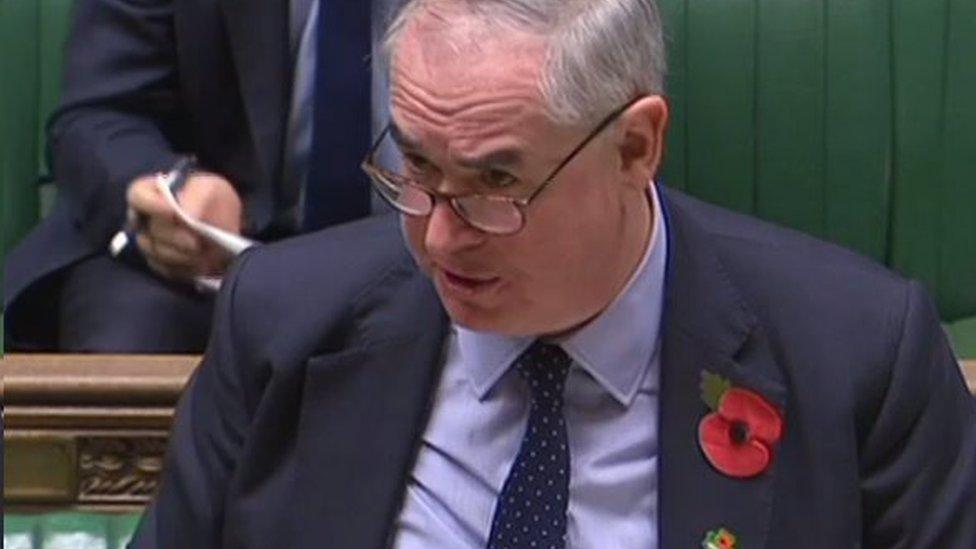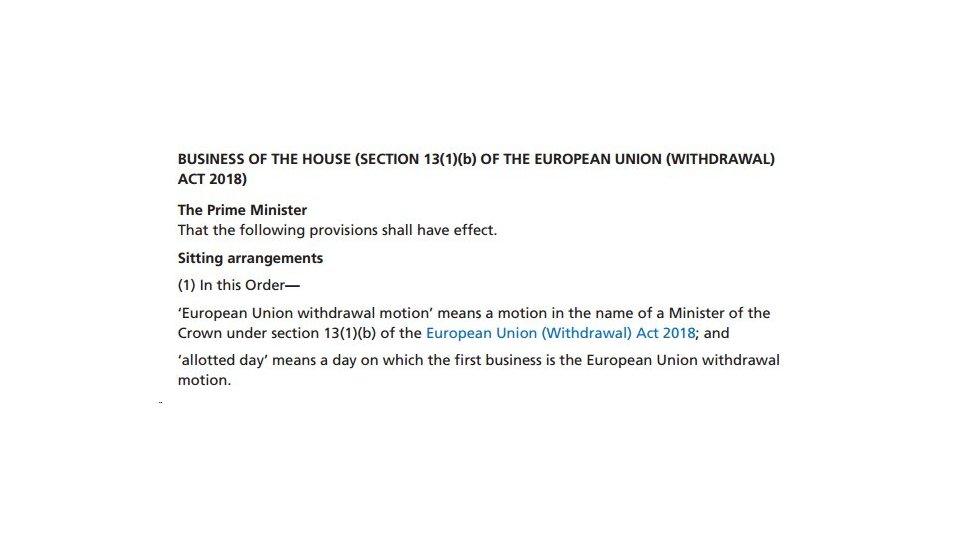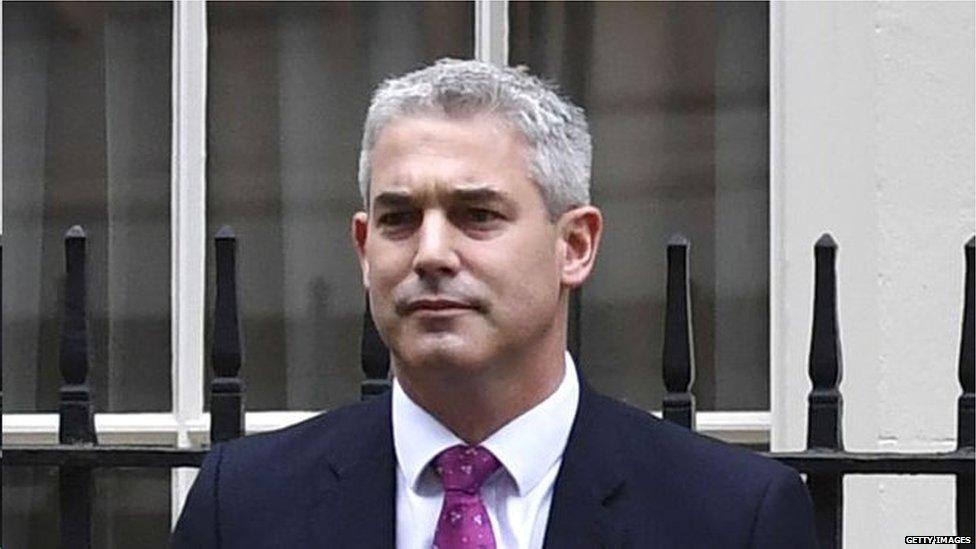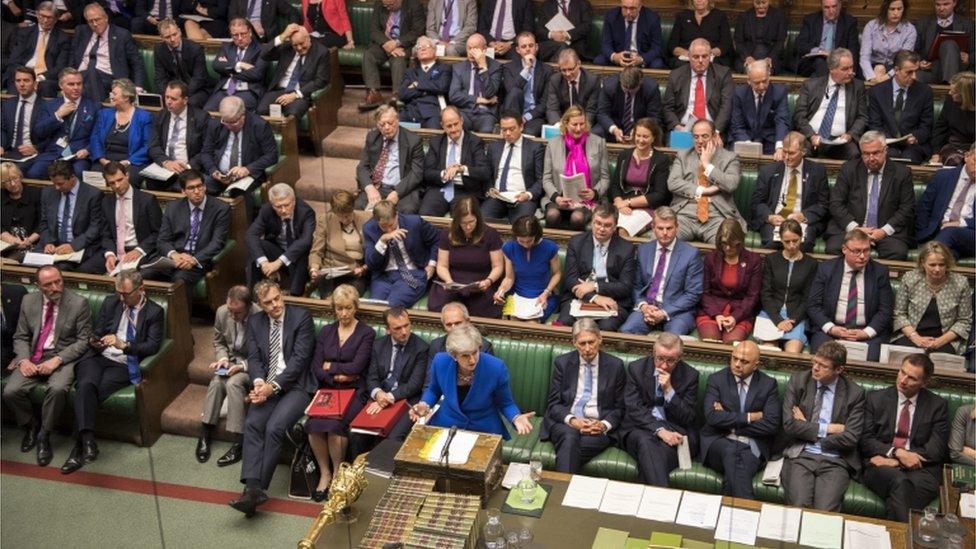Week ahead in Parliament
- Published
- comments

The Attorney General will be answering questions from MPs about the legal advice to the government on the Northern Ireland backstop arrangements
Eyes down for 40 hours of Commons debate on the PM's Brexit deal, culminating in the "meaningful vote" - not to mention two days of Lords debate on their "meaning-less" vote.
While, as ever, there is plenty of interesting action on other issues in the coming week, everything is totally overshadowed by Brexit....and Westminster is genuinely puzzled at the government's strategy.
The prime minister seems to be heading, quite unperturbed, towards a massive defeat in the vote on 11 December, and the government whips are not visibly active and scurrying around to win over wavering MPs.
So what's going on? Is this simply fatalism? Has the government factored in an initial defeat, as just the first phase of a cunning plan which will culminate in the eventual ratification of the deal, or something very like it?
Let's look at the way events will unfold....
(And, by the way, a parliamentary insider tweets that actually the last two hours or so of the time allocated for the Meaningful Vote will be taken up by votes - so really we're looking at 38 hours of debate…. )
The fun begins on Tuesday 4th, with a debate on the Business of the House Motion, external which sets out the framework for the debate.

This guarantees eight hours of debate for five days, ending on Tuesday 11th, with votes on up to six amendments, and then a vote on the motion (as amended, if any amendments are agreed). So the first point to note is that the government has dropped the idea that had previously been floated, of a rather more exotic procedure, in which MPs would have been invited to vote on the main motion first, and only then consider amendments: a notion designed to give a "clean vote" on its deal, as presented.
This was probably a wise decision, because it avoided any suggestion of a skewed process.
The business motion says the Speaker should not select the amendments until the final day of debate - which would give him a chance to assess which had the biggest head of steam behind them.
As I write, new amendments are surfacing at regular intervals. There's a big official Opposition amendment signed by Jeremy Corbyn and Sir Keir Starmer, which seeks to reject the government deal and stop the UK leaving the EU with no deal at all; it at least implies seeking an extension of the Article 50 period, keeping the UK in the EU for a bit longer, while a different alternative is constructed - and that could include Labour's preferred option of a General Election, or a further referendum.
Hilary Benn, the chair of the Brexit Committee, has a cross party amendment which also seeks to block the PM's deal, and no deal - and then adds a procedural tweak which would allow the Commons to pass a motion on what to do next, in the event that no agreement on any kind of Brexit could be voted through.
And because this is a procedural, rather than a substantive issue, that might allow everyone from hard Brexiteers, to hard Remainers to back it as a means to their ends.
Then there are three amendments on the Northern Ireland backstop - perhaps the biggest problem for a lot of Conservative MPs opposed to the PM's deal, not to mention their Northern Ireland allies, the DUP.
The amendments from Conservatives Sir Edward Leigh and Giles Watling, and the independent MP Frank Field, all suggest different ways of making the backstop a temporary mechanism rather than a permanent trap to keep the UK in the EU single market.
This could provide a Get Out of Jail Free Card, which might release a majority of MPs to swing behind the deal. Or not. Much will depend on whether these mechanisms look workable, and that will doubtless be a big theme of the coming debates.
Two much discussed possibilities that may not appear are a further referendum (aka a so-called "People's Vote") and the "Norway option" of moving the UK into a Norway-style associate membership of the EU single market.
Supporters of both these ideas are debating whether they should hold their fire and wait for the reality of deadlock to sink in, and only then propose their preferred solutions. Speeches will be scrutinised closely for signs that key individuals or entire factions might be hardening their position or wavering in some way - and many of the strategists involved are already trying to think several steps ahead, beyond the votes at the end of this process.
The number of amendments allowed under the government's Business of the House Motion is enough to take the debate beyond party lines - the Speaker would be able to select a couple of party amendments and then a number of cross-party amendments.
Six does not seem an unreasonable number - there are normally four amendments for a Queen's Speech debate, for example, but the Business Motion will itself be amendable, so if a majority of MPs think there should be more, they will have the opportunity to allow that.
So, come Tuesday 11th, there will be up to six votes on amendments, followed by the final vote. That will start at 7pm, and the whole process could take a couple of hours.
And what happens then could be very important. If the prime minister's deal is rejected, she will have the chance to react immediately, rather as David Cameron did in August 2013, when MPs rejected plans for British military intervention in Syria, when he told MPs: "I get that and the government will act accordingly."
Theresa May might announce a new plan - which could be almost anything - a renegotiation, a pivot to the Norway option, who knows? Or she might want to mull things over until her PMQs the next morning.
But she might face a direct attack in the form of a no confidence motion from the Leader of the Opposition - this could well be down within femtoseconds, external of the result, and would take priority for debate the next day...... but would it be more likely to bolster Conservative solidarity and re-attach the DUP to the Tories, rather than bring the government down?
As ever, there's plenty more going on in the Lords, on the committee corridor and elsewhere - but Brexit overshadows all.
Here's my rundown...
Monday 3 December
A momentous Commons week opens (2.30pm) with Home Office questions - perhaps to be followed with the usual Monday crop of urgent questions and ministerial statements.
This looks likely to include a statement from the PM on the G20 summit, which will probably expand to cover all kinds of Brexit matters, and then a statement from the Attorney General, Geoffrey Cox, on his legal analysis of the Brexit Deal - which will be made under the cloud of accusations of contempt of Parliament, because the government has yet to obey a resolution of the House calling for it to publish the full advice.
Full-dress Commons statements by the Attorney General are pretty rare occasions, and, aside from the rather important substance of the discussion, this one will attract some interest because (whisper it quietly) the A-G is now being mentioned as a long-shot Brexiteer candidate for the Conservative leadership
The main legislation is the second reading debate on the Crime (Overseas Production Orders) Bill, external which would create a legal mechanism for international treaties which would allow UK law enforcement agencies to approach companies based in the US and possibly elsewhere, to obtain data on UK citizens in criminal proceedings. It untangles some complications of international law, and is not especially controversial.
There's an interesting adjournment debate as the SNP's Stephen Gethins raises the subject of Scotland's foreign policy footprint - the underlying thought is that Scotland has a distinct international identity which could be developed and harnessed either as an independent country or within the UK.
And MPs will rubber stamp the appointment of two hard Brexiteers to key select committees; former DEXEU minister Steve Baker will take a seat on the Treasury Committee, replacing Stephen Hammond, who has joined the government; while Anne Marie Morris goes on the Public Accounts Committee, in place of high-flying new MP Gillian Keegan, who has taken the first step on the government ladder as a PPS in the Treasury.
In Westminster Hall (4.30pm) there's a Petitions Committee debate on e-petition 226071, external: Stop a possible second referendum on EU membership."
The petition argues that "there is a growing band of people that want to reverse the result of the democratic vote of this country to leave the European Union and are calling for a second referendum. This is mainly by the people that lost the vote two years ago and cannot accept the democratic vote of the majority decision." It attracted 119,532 signatures.

Brexit Secretary Stephen Barclay will be appearing before the Brexit Committee
On the committee corridor the obvious highlight is the Exiting the European Union Committee's session (1.30 pm) with the new Brexit Secretary, Stephen Barclay, who will be sitting alongside the man many regard as the real Brexit Secretary, the prime minister's Europe adviser Olly Robbins - a figure high in Brexiteer demonology.
Meanwhile the Housing, Communities and Local Government Committee will be continuing its inquiry into the future of the High Street, with assorted retail titans, including Sports Direct CEO, Mike Ashley (3.30pm).
In the Lords (2.30pm), peers embark on the first of two days of report stage consideration of the Counter-Terrorism and Border Security Bill, external, where the key issues are around the powers the bill would give ministers to designate areas in foreign countries as in effect no-go areas for British citizens, because of terrorism-related activities.
Labour expect to force votes on some of these issues.
As I write, there are rumours that the government might announce a major concession on the bill, to head off a possible defeat. There will also be a short debate on preventing the use of image and performance enhancing drugs in amateur and junior sport.
Tuesday 4 December
The Commons opens (11.30am) with Foreign Office questions, followed by a Ten Minute Rule Bill from the Conservative John Howell. He is the backroom architect of the local planning reforms made under the Coalition, and his bill would limit the right of appeal against planning decisions taken in accordance with guidelines set out by local authorities in their Local Plans.
Then comes the opening act in the five-day "Meaningful Vote" debate. This will incorporate what might prove to be quite a substantial debate on the Business of the House Motion, which sets out how the debate will work (see above).
The theme for the opening day will be immigration - which, in the absence of the long-awaited white paper setting out the government vision for a post Brexit immigration policy, may be tricky for ministers. The themes, incidentally, are quite loose, in the sense that the front benchers are expected to stick to them, but the backbenchers will be allowed to range across any subject area they fancy.

Free cash machines are closing across the country
In Westminster Hall, debates include the effect of ATM closures on towns, high streets and rural communities (9.30am) and cared-for children educated out of area (11am). Kent Conservative Gordon Henderson is concerned about the number of children in council care from London and other counties being sent to Kent schools - both on the grounds of the cost and because of safeguarding, and their possible vulnerability to abuse or recruitment by "county lines" criminal gangs.
At 2.30pm, the Lib Dem Layla Moran leads a debate on mental health and wellbeing in schools - she argues that the issues with school funding and a restrictive over-tested curriculum fuel a wider crisis in young people's mental health. She will focus on support in schools and why the pastoral element is being overlooked.
My committee pick is the Home Affairs Committee evidence session (2.30 pm) on serious violence, with witnesses from the National Police Chiefs' Council, the National Crime Agency, the Children's Society and Local Government.
In the Lords (2.30 pm) the first business is the introduction of Baroness Osamor, an ally of Jeremy Corbyn, a former Labour councillor in the London Borough of Haringey and a founding member of the Broadwater Farm Defence Campaign. She is the mother of Labour MP, Kate Osamor
The main legislative action is second reading debate for a Brexit Bill, the Financial Services (Implementation of Legislation) Bill., external This would provide the power, in the event of a no-deal exit from the EU, for the UK to implement and make changes to a specified list of 'in-flight files' - European Union financial services legislation agreed or in negotiation at the point of exit, with implementation dates falling in the two years after exit.
If the UK were to leave without a Withdrawal Agreement, or an implementation period, the government would have difficulties updating financial services law - so the bill provides a mechanism to allow the Treasury to make changes to a complex and highly detailed body of law. This is a very small no-deal contingency bill and will run for a couple of hours. Next, comes five SI approval motions: two to be taken together on social security (EU Exit), the second on Northern Ireland; on competition regulations (EU Exit); on postal and parcel services (EU Exit) and on tobacco and nicotine inhaling products.
Wednesday 5 December

MPs begin their day (11.30am) with half an hour of Welsh questions - followed at noon by Prime Minister's Questions.
The day's Ten Minute Rule Bill, from Labour's Tulip Siddiq, zeros in on concerns among MPs about people being detained for prolonged periods under immigration laws; it would cap the maximum period of detention under the Immigration Act 1971 of 28 days
Then MPs move on to day two of the Meaningful Vote debate, expected to be around the theme of transport.
In Westminster Hall, debates include former minister Greg Hands on the future of free schools and academies in England (9.30am) - his concern is both about the profusion of new schools (particularly secondary) in West London since 2010, and possible threats to their future.
Labour's Shabana Mahmood leads a debate on reforming the regulation of shisha lounges (2.30pm). These are cafes or lounge where people smoke water pipes, which raise complications because the smoke-free laws do not cater well for them.
The chair of the Work and Pensions Select Committee, Frank Field, has a debate on affordable credit for people on low incomes (4pm), and the Labour MP Stella Creasy discusses the gender pay gap (4.30pm).
In the Lords, peers start earlier than usual (11am) for their debate on the prime minister's Brexit deal. MPs have a Meaningful Vote on an amendable motion; peers will debate a motion to "take note", or, as some peers joke, a meaning-less vote.
Labour have an amendment down which notes that it is for the House of Commons to determine the matter, but warns against a no deal outcome to negotiations under Article 50(2) of the Treaty on European Union. As I write, 127 peers are listed to speak.
The debate will be interrupted at 3pm for the usual half hour of questions to ministers.
Thursday 6 December
Just in case they have not had enough Brexiting, MPs open their day (9.30 am) with Exiting the European Union questions - which will see the question time debut of the new Secretary of State, Steve Barclay. Then come Business Questions to the Leader of the House, Andrea Leadsom, and then they return to the Meaningful Vote debate - which is expected to centre on industrial strategy issues.
In Westminster Hall (1.30pm) business opens with a select committee statement on the publication of the Eighth Report of the Education Committee, Nursing degree apprenticeships: in poor health?, external by the committee chair and former education minister, Robert Halfon.
Then, fresh from her triumph in getting her private member's bill, the Homes (Fitness for Human Habitation) Bill, through the Commons, the Labour MP Karen Buck leads a debate on use of Section 21 evictions in the private rented sector - sometimes called "no-fault evictions".
These are used when a landlord requires the tenant to vacate a rented property. Campaigners say they are the preferred tool for "revenge evictions" against tenants who have complained about conditions, asked for repairs or otherwise annoyed their landlord.
In the Lords (11am) peers open with their normal half hour question time, and then continue their debate on the Brexit deal.
Neither House sits on Friday.